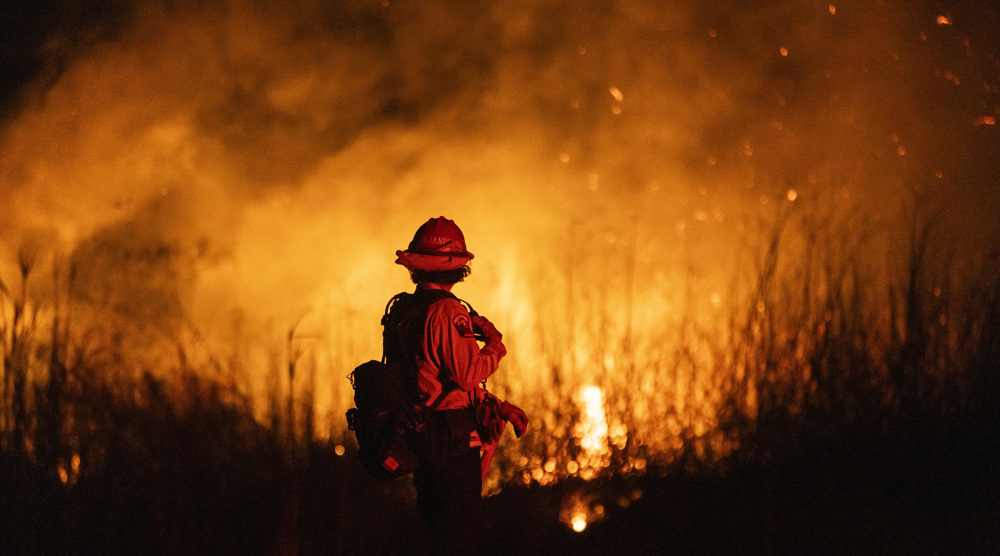Brutal Western sanctions hamper Iran’s fight against drug trafficking: Police commander
The brutal sanctions imposed by Western countries on the Islamic Republic have stymied Iran’s capacity to fight drug trafficking by depriving it of the necessary equipment, says a senior Iranian police official.
In an exclusive interview with Press TV on Sunday, Colonel Majid Karimi, who heads the Iran Drug Control Headquarters, said, “Brutal sanctions against Iran have made fighting drug trafficking difficult.”
“We need advanced equipment to fight drugs smuggling, but the sanctions have caused us problems for acquiring those equipment.”
Addressing countries that have imposed sanctions on Iran, Karimi said those states must come to the understanding that “our fight is not just for our country, but it also benefits other countries, especially Western countries, especially the countries in Europe.”
“We discover an average 2.5 tonnes of drugs per day in our country and stop them from reaching other markets,” the top-ranking police official said, warning of the consequences if Iran stopped fighting drug transit through its soil even for a month.
“We have tried to turn the threat of sanctions into an opportunity. Therefore, we have turned to our own domestic science-based companies and we are now using the capacity of our scientists in Iran to produce necessary equipment inside the country.”
Karimi said, “I tell the developed countries that they must play a role in this fight and help us as no country in the world can fight drug trafficking on its own.”
The police official went on to say that Iran’s eastern neighbors are hubs for production and distribution of narcotics to the entire world, and as the United Nations has announced, “more than 80% of the world’s opium is produced in Afghanistan.”
Stressing that Iran has a 900-kilometer border with Afghanistan, Karimi said Iran is located on the transit route to Europe and the bulk of narcotics produced in Afghanistan are destined for European states.
Citing a UN announcement last year, Karimi said the seizure of more than 48 percent of morphine, 26 percent of heroin and over 90 percent of opium in the world has been conducted by the Iranian police.
Underlining that the Islamic Republic will continue to fight drug trafficking without any political considerations, Karimi said, “We are doing our job of fighting drugs inside our country and to this end, more than 3,820 of Iranian police personnel have embraced martyrdom in the anti-drug fight and about 12,000 others sustained injuries.”
“We believe narcotics are the common enemy of the human society, but based on the principle of shared responsibility, other countries must also pitch in and do their part in this fight,” the top-ranking police official concluded.
On Friday, Kazem Gharibabadi, Iran’s permanent representative to the Vienna-based international organizations, hailed the country's battle against drug trafficking, saying the Islamic Republic had managed to confiscate the world's largest amount of narcotics over the past years despite the illegal US sanctions.
“The Islamic Republic has discovered and confiscated the world's largest amount of narcotics for many years while it has been subject to unilateral, illegal and illegitimate US sanctions and deprived of the international community's help," Gharibabadi said at a special commemorative event of the 63rd session of the Commission on Narcotic Drugs, devoted to the UN International Day against Drug Abuse and Illicit Trafficking.
The Iranian envoy also noted that the country has over the past four decades suffered “irreparable financial and human losses” in its anti-drug fight.
Iran shares 1,600 kilometers of border with Afghanistan and Pakistan, and lies on the main trafficking route for poppy, the source of opium and heroin, from Afghanistan to Western Europe.
The country believes the international community must take joint responsibility and resume technical contributions to control drug trafficking and its impacts in the region and beyond.
Iran seeks South Korea’s assistance for AI, fiber-optic projects
VIDEO | Iran's 'Eqtedar' (Power) maneuver
Israel hits HTS military target in Syria for 1st time since fall of Assad
VIDEO | Press TV's news headlines
Israel has slaughtered 13,000 students in Gaza, West Bank
VIDEO | More Zionist than Zionists: Biden’s legacy to be defined by Gaza genocide
Hamas confirms handing approval of Gaza ceasefire deal to mediators
VIDEO | Iran: Show of strength











 This makes it easy to access the Press TV website
This makes it easy to access the Press TV website